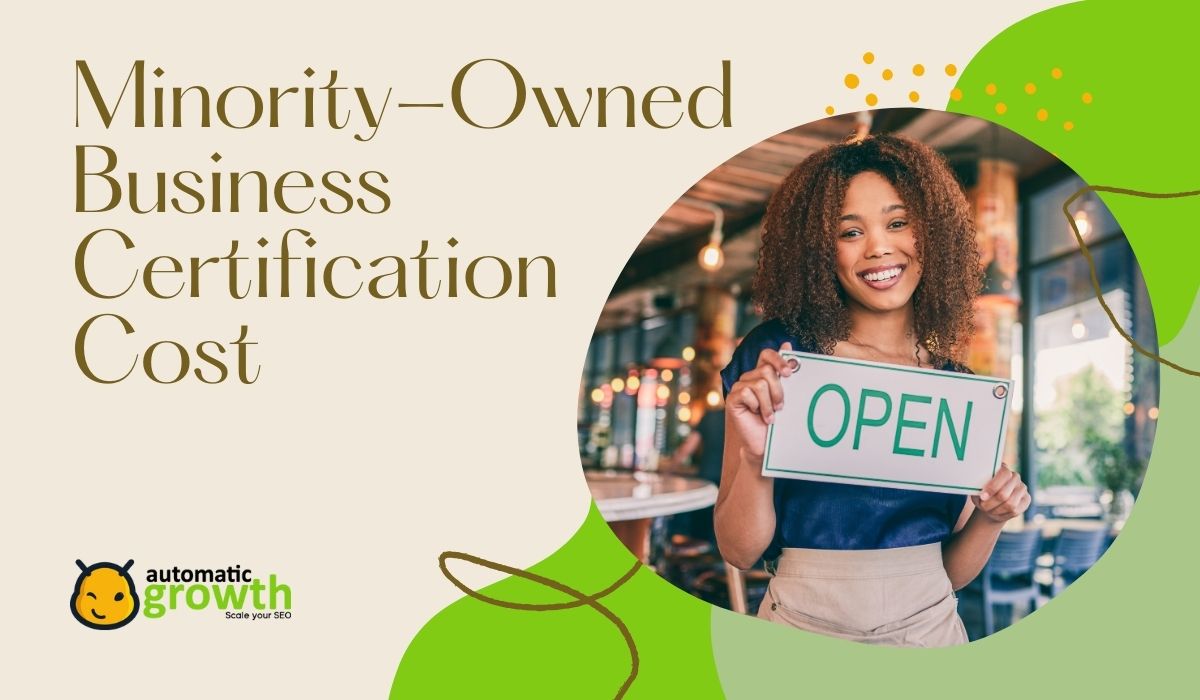Navigating the landscape of minority-owned business certification cost can be a complex process, filled with varying requirements and potential benefits that can significantly impact your business's growth and opportunities. Understanding the financial investment required for certification is crucial for minority business owners who are weighing the benefits against the expenses.
From application fees to potential consultancy charges, we will explore all the possible expenses that a business might encounter. In this comprehensive guide, we delve into the intricate details of the costs associated with obtaining minority-owned business certification.
What Is Minority-Owned Business Certification?
According to the U.S. Senate Committee on Small Business and Entrepreneurship, in 2022, there were 9.7 million minority-owned businesses in the U.S. [1] These lucrative businesses were growing at a rate of 10 times faster than the overall growth rate for U.S. ventures.
Minority-owned business certification is a designation given to businesses that are majority-owned and operated by individuals from minority groups. This certification is designed to support minority entrepreneurs by providing them access to more opportunities for business growth and development. It is a powerful tool for enhancing the visibility of minority-owned businesses in competitive markets and for fostering diversity in the corporate supply chain.
To be considered a minority-owned business, the company must be at least 51% owned, managed, and controlled by one or more individuals from recognized minority groups. These groups typically include the following:
-
African Americans
-
Hispanic Americans
-
Native Americans
-
Asian-Pacific
-
Subcontinent Asian Americans
The certification process involves a detailed application and review process to ensure that the business meets the necessary criteria.
“In 2022, there were approximately 9.7 million minority-owned businesses in the U.S.” |
The certification is provided by various entities, including federal, state, and local government agencies, as well as private organizations. Some of the most recognized certifications come from:
-
The National Minority Supplier Development Council (NMSDC)
-
The U.S. Small Business Administration's 8(a) Business Development program
-
State and local government certification programs
-
City-specific programs like the New York & New Jersey Minority Supplier Development Council
How to Get Minority-Owned Business Certification
Obtaining Minority-Owned Business Certification can be a strategic move for eligible businesses looking to access new growth opportunities. Here’s a step-by-step guide on how to get certified:
1. Determine Eligibility
First, ensure that your business qualifies as a minority-owned enterprise. Generally, this means:
-
The business must be at least 51% owned, operated, and controlled by individuals from a recognized minority group (African American, Hispanic American, Native American, Asian-Pacific, Subcontinent Asian American, etc.).
-
The minority owner(s) must be U.S. citizens.
-
The minority owner(s) must be actively involved in the day-to-day operations and management of the business.
2. Choose the Right Certification Body
Several organizations offer Minority-Owned Business Certification. Some of the most recognized include:
-
National Minority Supplier Development Council (NMSDC): Offers certification that is widely recognized by corporate America.
-
U.S. Small Business Administration (SBA): Offers the 8(a) Business Development program, which is a broader certification that includes support for minority businesses.
-
State and Local Government Agencies: Offer their own certifications that may be recognized by local and state government procurement agencies.
-
City and County Programs: Some local governments have their own certification processes, which may provide opportunities within specific locales.
3. Gather Required Documentation
The certification process will require various documents, which may include:
-
Proof of minority status (birth certificates, U.S. passports, etc.)
-
Business license and Articles of Incorporation
-
Stock certificates and stock ledger
-
Operating agreement or partnership agreement (if applicable)
-
Company financial statements
-
Resumes for all principals
-
Evidence of day-to-day control of the business by the minority owner(s)
“Minority business enterprises (MBEs) contributed over $1.4 trillion in total economic output to the U.S. economy in 2019.” |
4. Complete the Application
Fill out the certification application provided by the certifying body. This will involve detailed information about your business structure, financials, and operations.
5. Pay Application Fees
Some certifying bodies require an application fee. The minority-owned business certification cost can vary based on the size of your business and the certifying agency.
6. Undergo the Certification Process
The certification process may include a review of your application and documents to ensure accuracy and completeness, an on-site visit to confirm the validity of the information provided, and interviews with the minority owner(s) to assess their control and involvement in the business.
7. Receive Your Certification
Once approved, you’ll receive a certificate indicating your status as a certified minority-owned business. This certification is typically valid for one to three years, after which you must renew it. After certification, take full advantage of the benefits by:
-
Registering with government and corporate supplier diversity programs.
-
Networking with other minority-owned businesses.
-
Attending workshops, training, and events designed for certified businesses.
8. Maintain Compliance
Ensure that you maintain the standards required for certification, including the minority ownership and control criteria, and be prepared for periodic reviews or audits by the certifying body. Keep track of the expiration date and start the renewal process in advance to ensure there is no lapse in your certification status.
Remember, the specific requirements and process steps can vary depending on the certifying body and the location of your business. Always refer to the guidelines provided by the organization from which you are seeking certification for the most accurate and detailed instructions.
Unraveling the Minority-Owned Business Certification Cost
The certification process is not without its expenses, and these can vary depending on several factors, including the certifying body, the size of the business, and the type of certification being sought.
“Despite their growth, minority-owned businesses often face challenges such as limited access to capital and markets.” |
Types of Costs Involved
-
Application Fees: Most certifying bodies charge an application fee to process your certification. This fee can range from a few hundred to over a thousand dollars. For example, the National Minority Supplier Development Council (NMSDC) charges an application fee that varies by regional council.
-
Consultation Fees: If you decide to hire a consultant to assist with the application process, this will be an additional cost. Consultants can help ensure that your application is complete and accurate, which can save time and improve your chances of approval.
-
Renewal Fees: Certification is not permanent; it typically needs to be renewed annually or every few years. This means you will incur renewal fees, which may be similar to the initial application fees.
-
Additional Costs: There may be indirect costs such as the time spent gathering documents, filling out forms, and potentially traveling to meet with certifying officials or attend mandatory workshops.
Potential for Waivers or Reduced Fees
Some businesses may qualify for waivers or reduced fees based on their size, revenue, or economic hardship. It's important to inquire with the certifying body about any such opportunities.
Long-Term Investment Consideration
While there are upfront minority-owned business certification cost, it's also important to consider the long-term return on investment. The benefits of certification, such as access to exclusive contracts, networking opportunities, and other resources, can far outweigh the initial and ongoing business costs.
Benefits of a Minority-Owned Business Certification
Minority-owned business certification offers a range of benefits designed to support and elevate minority-owned businesses in a competitive marketplace. Here are some of the key advantages of obtaining such a certification:
-
Access to New Opportunities: The Minority Business Development Agency (MBDA) reported that minority business enterprises (MBEs) contributed over $1.4 trillion in total economic output to the U.S. economy and were responsible for the creation and maintenance of 7.2 million jobs in 2019. [2] Certification can open doors to new business opportunities, especially with corporations and government agencies that have diversity procurement programs.
-
Government Contracts: Many government contracts are set aside specifically for certified minority-owned businesses. This reduces competition and gives certified businesses a better chance at winning government work.
-
Networking Opportunities: Certified businesses gain access to a network of other minority-owned companies and potential clients. This network can be invaluable for referrals, partnerships, and joint ventures.
-
Training and Development: Certifying organizations often provide business development programs, workshops, and training that can help minority business owners grow and manage their companies more effectively.
-
Increased Visibility: Certification can enhance a business's visibility among companies that are looking to increase their spending with minority-owned businesses as part of their diversity and inclusion initiatives.
-
Private Sector Opportunities: Many private sector companies, not just government agencies, seek out certified minority-owned businesses to work with as suppliers, contractors, and service providers.
-
Financing Opportunities: Despite their growth, minority-owned businesses often face challenges such as limited access to capital and markets. For instance, according to a study by the Brookings Institution, Black-owned businesses start with approximately three times less overall financial capital compared to white-owned businesses. [3] Some financial institutions have programs that offer loans and grants to certified minority-owned businesses, often with more favorable terms and interest rates.
Take the Next Step: Register Your LLC Today
While the minority-owned business certification costs—ranging from application fees to potential consultancy charges—require careful financial planning, the long-term benefits often surpass these expenditures. It's crucial for businesses to not only consider the immediate costs but also to keep an eye on the horizon, where the true value of certification lies in the growth and sustainability it fosters.
Ready to build a strong foundation for your business and explore the avenues of growth that certification can offer? Take the next step in your entrepreneurial journey—register your business as an LLC. This crucial move not only fortifies your business structure but also prepares you for the process of becoming a certified minority-owned business. Begin your LLC registration today and set the stage for a world of new opportunities.
















